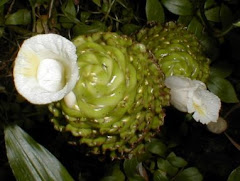


ATTRIBUTED MEDICINAL PROPERTIES
Ginger is most commonly known for its effectiveness as a digestive aid. By increasing the production of digestive fluids and saliva, ginger helps relieve indigestion, gas pains, diarrhea and stomach cramping. Ginger is also used to treat nausea related to both motion sickness and morning sickness.
Ginger has a yellow color, which indicates its use in the digestive system as well as with any yellowish fluids associated with the body.
Z.officinale is carminative (digestive aid), pungent, stimulant, diuretic and antiemetic used widely for indigestion, stomachache, malaria and fevers. Ginger with lime juice and rock salt increases appetite and stimulates the secretion of gastric juices.
Anti-emetic Activity: Early animal studies had demonstrated the anti-emetic property of fresh ginger, but it was the clinical work of Mowrey and Clayson which generated a wider interest in this use of ginger. They compared the effects of 1.88g of dried powdered ginger, 100mg dimenhydrinate (Dramamine) and placebo on the symptoms of motion sickness in 36 healthy subjects who reported very high susceptibility to motion sickness.
Improvement of digestive function: Early Chinese and Japanese research found that oral and intragastric application of fresh ginger decoction produced a stimulant action on gastric secretion.
German scientists found that chewing 9g of crystallised ginger had a profound effect on saliva production. Amylase activity was also increased and the saliva was not more watery, although it contained slightly less mucroprotein. Intraduodenal doses of ginger extract increased bile secretion in rats. Total secretion of bile solids was also increased, but not to the same extent as bile flow. 6- gingerol and 10-gingerol were identified as the active components. Fresh ginger also contains a proteolytic enzyme.
Ginger, in conjunction with other pungent Ayurvedic herbs, increased the bioavailability of a number of drugs by promoting their absorption and/or protecting them from being metabolized in their first passage through the liver.
Oral doses of 6-shogaol accelerated intestinal transit in rats. Also an extract of ginger, and isolated 6-shogaol and gingerols, enhanced gastrointestinal motility in mice after oral doses.
Anti-ulcer Activity: Ginger and 6-gingerol inhibited experimental gastric ulcers in rats. Fresh ginger decocted in water resulted in symptomatic improvement in 10 patients with peptic ulcers.
Antiplatelet Activity: Srivastava and co-workers found that aqueous extract of ginger inhibited platelet aggregation induced by ADP, epinephrine, collagen and arachidonic acid in vitro. Ginger acted by inhibiting thromboxane synthesis. It also inhibited prostacyclin synthesis in rat aorta. The antiplatelet action of 6-gingerol was also mainly due to the inhibition of thromboxane formation.
Anti-inflammatory Activity: Ginger extract inhibited carrageenan-induced paw swelling and was as active as aspirin. Essential oil of ginger inhibited chronic adjuvant arthritis in rats. Ginger and its pungent components are dual inhibitors of arachiodonic acid metabolism. That is, they inhibit both cyclooxygenase (prostaglandin synthetase) and lipoxygenase enzymes of the prostaglandin and leukotriene biosynthetic pathways.
Antipyretic Activity: Ginger extract given orally reduced fever in rats by 38%, while the same dose of aspirin was effective by 44%. The antipyretic activity of 6-shogaol and 6-gingerol has also been observed.
Cardiovascular Effects: Ginger exerted a powerful positive inotropic effect on isolated guinea pigs left atria. Gingerols were identified as the active components.
Antioxidant Activity: Extracts of ginger have pronounced antioxidant activity comparable to that of synthetic antioxidant preservatives.
Other Effects: Ginger extract exhibited a prolonged hypoglycaemic activity.
Ginger root is widely used as a digestive aid for mild stomach upset and is commonly recommended by health care professionals to help prevent or treat nausea and vomiting associated with motion sickness, pregnancy, and cancer chemotherapy. Ginger is used as support in inflammatory conditions such as arthritis, and may have blood thinning and cholesterol lowering properties that may make it useful for treating heart disease or cancer.
Motion Sickness
Several studies suggest that ginger may be more effective than placebo in reducing symptoms associated with motion sickness. In one trial of 80 novice sailors (prone to motion sickness), those who took powdered ginger experienced a significant reduction in vomiting and cold sweating compared to those who took placebo. Similar results were found in a study with healthy volunteers.
Conventional prescription and non-prescription medicines that decrease nausea may also cause unwanted side effects, such as dry mouth and drowsiness. Given the safety of ginger, many people find it a welcome alternative to these medications to relieve their motion sickness.
Pregnancy Related Nausea and Vomiting
A limited number of human studies suggests that 1 gram daily of ginger may be safe and effective for pregnancy-associated nausea and vomiting when used for short periods (no longer than 4 days). Several studies have found that ginger is more effective than placebo in relieving nausea and vomiting associated with pregnancy. In a small study including 30 pregnant women with severe vomiting, those who ingested 1 gram of ginger every day for four days reported more relief from vomiting than those who received placebo. In a larger study including 70 pregnant women with nausea and vomiting, those who received a similar dosage of ginger felt less nauseous and experienced fewer vomiting episodes than those who received placebo.
Diarrhea
Ginger compounds are active against a form of diarrhea which is the leading cause of infant death in developing countries. Zingerone is likely to be the active constituent against enterotoxigenic Escherichia coli heat-labile enterotoxin-induced diarrhea.
Chemotherapy nausea
There is evidence from a few studies that suggests ginger reduces the severity and duration of nausea (but not vomiting) during chemotherapy. Long-term studies should be performed to confirm these results and to establish safety.
Nausea and vomiting following surgery
Z.officinale has been found effective in multiple studies for treating nausea caused by seasickness, morning sickness and chemotherapy, though it was not found superior over a placebo for post-operative nausea.
Research has produced mixed results regarding the use of ginger in the treatment of nausea and vomiting following surgery. In two studies, 1 gram of ginger root before surgery reduced nausea as effectively as a leading medication. In one of these two studies, women who received ginger also required fewer nausea-relieving medications following surgery.
Inflammation
In addition to providing relief from nausea and vomiting, ginger extract has long been used in traditional medical practices to decrease inflammation. In fact, many health care professionals today use ginger to help treat health problems associated with inflammation, such as arthritis and ulcerative colitis.
In a study of 261 people with osteoarthritis (OA) of the knee, those who received a ginger extract twice daily experienced less pain and required fewer pain-killing medications compared to those who received placebo.
Other uses
Laboratory studies have also found that components in ginger may have anticancer activity. More research needs to be performed to determine the effects of ginger on various cancers in humans.
REGIONAL USES
India
Fresh ginger is one of the main spices used for making pulse and lentil curries and other vegetable preparations. It is used fresh to spice tea especially in winter. Ginger powder is also used in certain food preparations particularly for expecting women and feeding mothers, the most popular one being Katlu which is a mixture of gum resin, ghee, nuts, and sugar.
South India
Ginger is used in the production of a candy called Inji-murappa ("ginger candy" from Tamil). This candy is mostly sold by vendors to bus passengers in bus stops and in small tea shops as a locally produced item. Candied or crystallized ginger (ginger cured with sugar) is also common. Additionally, in Tamil Nadu, especially in the Tanjore belt, a variety of ginger which is less spicy is used when tender to make fresh pickle with the combination of lemon juice or vinegar, salt, and tender green chili peppers. This kind of pickle was generally made before the invention of refrigeration and stored for a maximum of 4-5 days. The pickle gains a mature flavor when the juices cook the ginger over the first 24 hours. Ginger is also added as a flavoring in tea.
Burma
Z.officinale is used in a salad dish called gyin-tho, which consists of shredded ginger preserved in oil, and a variety of nuts and seeds.
Indonesia
A beverage called Wedang Jahe is made from ginger and palm sugar. Indonesians also use ground ginger root, called jahe or djahe, as a frequent ingredient in local recipes.
China
Sliced or whole ginger root is often paired with savory dishes such as fish. However, candied ginger is sometimes a component of Chinese candy boxes, and a herbal tea can also be prepared from ginger.
Japan
Z.officinale is pickled to make beni shoga and gari or grated and used raw on tofu or noodles. It is also made into a candy called shoga no satozuke.
Korea
Ginger is finely minced and added to the ingredients of the spicy paste just before the fermenting process.
Western
Z.officinale is traditionally used mainly in sweet foods such as ginger ale, gingerbread, ginger snaps, ginger cake and ginger biscuits. A ginger-flavored liqueur called Canton is produced in Jarnac, France. Green ginger wine is a ginger flavored wine produced in the United Kingdom, traditionally sold in a green glass bottle. Ginger is also used as a spice added to hot coffee and tea.
Caribbean
Ginger is a popular spice for cooking, and making drinks such as sorrel, a seasonal drink made during the Christmas season. Jamaicans make ginger beer both as a carbonated beverage and also fresh in their homes. Ginger tea is often made from fresh ginger as well.
Island of Corfu, Greece
Production of a traditional drink called (tsitsimpira), a type of ginger beer. The people of Corfu and the rest of the Ionian islands picked up the drink from the british, during the british occupation of the islands.
Arabic
Z.officinale is called zanjabil and in some parts of the Middle East, ginger powder is used as a spice for coffee.
Ivory Coast
Ginger is ground and mixed with orange, pineapple and lemon to produce a juice called Nyamanku.
A variety of uses are suggested for ginger. Tea brewed from ginger is a folk remedy for colds. Ginger ale and ginger beer have been recommended as "stomach settlers" for generations in countries where the beverages are made, and ginger water was commonly used to avoid heat cramps in the US. Ginger has also been historically used to treat inflammation, which several scientific studies support, though one arthritis trial showed ginger to be no better than a placebo or ibuprofen. Research on rats suggests that ginger may be useful for treating diabetes.
- In the West, powdered dried ginger root is made into capsules and sold in pharmacies for medicinal use.
- In Burma, ginger and a local sweetener made from palm tree juice (Htan nyat) are boiled together and taken to prevent the flu.
- In China, a drink made with sliced ginger cooked in sweetened water or a cola is used as a folk medicine for the common cold.
- In the Congo, ginger is crushed and mixed with mango tree sap to make tangawisi juice, which is considered as a universal panacea.
- In India, ginger is applied as a paste to the temples to relieve headache and consumed when suffering from the common cold, people use ginger for making tea, in food etc.
- In Indonesia, a type of ginger known as Jahe is used as a herbal preparation to reduce fatigue, reducing "winds" in the blood, prevent and cure rheumatism and controlling poor dietary habits.
- In the Philippines a traditional health drink called "salabat" is made for breakfast by boiling chopped ginger and adding sugar; it is considered good for a sore throat.
- In the United States,ginger is used to prevent motion and morning sickness. It is recognized as safe by the Food and Drug Administration and is sold as an unregulated dietary supplement.































































No comments:
Post a Comment